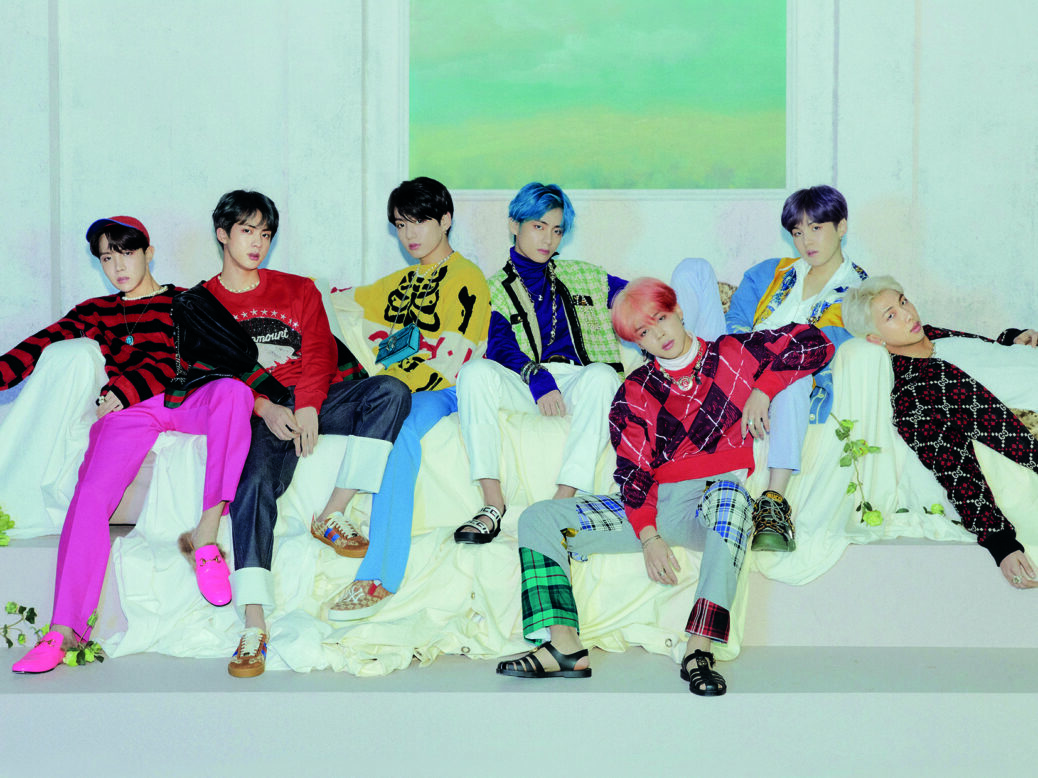
So here I am, on a muggy June evening at Wembley Stadium, a 50-year-old dad in a predominantly female and teenage crowd of 60,000 fans shrieking and roaring – “shroaring”? – at Beatlemaniac levels as seven young South Korean men appear onstage, their images flashing up on to the giant stage-side screens. The band is BTS – AKA Bangtan Sonyeondan, the Bangtan Boys, Bulletproof Boy Scouts, or Beyond the Scene, but usually just BTS. My official BTS light stick – a Bluetooth-enabled plastic orb – flickers in my hand like a firefly on acid in unison with the tens of thousands of others in the stadium. (For still-mysterious reasons I just paid £45 for this piece of kit – take that, Take That!) Band members V and J-Hope launch into the opening song, “Dionysus” and the shroaring goes up to 111. I bid my eardrums farewell for a couple of days and wonder for a moment, why are we all here again?
BTS are here because they are the biggest global east Asian act in history and their two shows at Wembley Stadium – the first of which reportedly sold out in 15 minutes – befit their status. (I could write a gritty Radio 4 psychodrama just about the ordeal of buying these tickets on the internet.) The figures are astonishing. This one pop group generates $3.6bn – not a typo – a year for the South Korean economy, and in 2017 one in 13 tourists to South Korea cited BTS as the motive for their visit. With an infectious mix of hook-laden EDM, rap, balladry and influences from jazz, funk and lo-fi, the band has topped the US Billboard album charts three times in a single year, a feat equalled only by the Beatles. (“It’s a bit of a burden to be called the Beatles of the 21st century,” one band member said at a press conference before the gig.)
The fans – known collectively as Army – are here because of the music and the seven idols in the band: RM (the leader), J-Hope, Suga, Jin, Jimin, Jungkook and V. True Armys effortlessly reel off their full Korean names. It isn’t wrong to describe this septet of collectables as a boy band, but that label is far from the whole story. Yes, the fanbase’s X chromosomes massively outnumber its Ys. Yes, the band wear foundation and lip-gloss and are exquisitely tailored. But the “greater band” includes producers and songwriters (the line is blurry), choreographers, set and costume designers, video directors, social-media handlers, and comprise a formidable, world-class creative and business organism. Songs are credited to several authors.
Most of their songs are largely in Korean, but fan translations appear nearly instantly on YouTube. The best of these are works of art: the glorious electro-stomper “Mic Drop”; the funkadelic “134340”, whose quirky POV is Pluto, dumped from the family of planets; the yearning, strident “Spring Day”. Surprising literary references appear in the band’s group and solo work, from Carl Jung and Hermann Hesse to Ursula le Guin and Douglas Adams. RM, the band’s thematic pathfinder and bibliophile, could talk about concept albums with the glitteriest of 1970s prog rockers. It’s a long, long way from the Monkees, Westlife or One Direction.
A close relationship with fans is no new thing, but BTS have taken artist-admirer intimacy to Himalayan heights. Band members have a social-media presence that goes back years, so that to join Army is to gain access to a sort of reality-TV channel dealing with the curated trials and triumphs of the road to stardom. This is ongoing. Within 90 minutes of leaving the second Wembley show, band-member Jung Kook was live-streaming his thoughts and feelings about it. I watched, along with 1.2 million others.
Many fans talk of being helped personally by the positive messages espoused by BTS’s more recent material, and in a world where perfection is incessantly demanded from young women, it is easy to understand the attraction of seven ever-courteous demigods who sing and talk about self-esteem, self-respect and loving yourself as you are.
Love is most definitely in the air tonight. After two hours of stadium-friendly BTS hits, inflatable metallic leopards, video content, five-star choreography, Jin’s 25th century piano, a flying Jungkook, fireworks, confetti cannons and streamer-geysers, the show ends with a 20-minute avowal of lifelong love from each of the members to the assembled Army. A cynic might wonder how sincere BTS’s tears of love could possibly be, stadium after stadium, tour after tour; or could marvel aloud at this latest monetisation of youth. But as I drift down Olympic Way with tens of thousands of humans who just had one of the best nights of their young lives, my daughter and niece among them, that cynic can go take a hike.
David Mitchell’s novels include “Cloud Atlas” and “The Bone Clocks”





